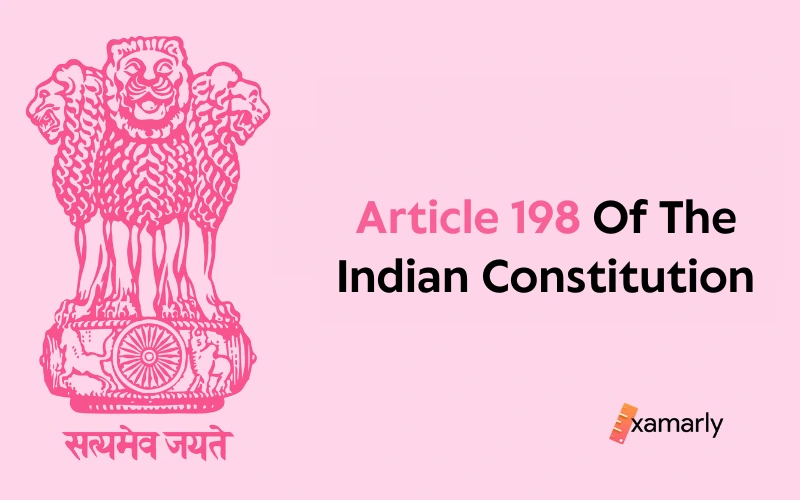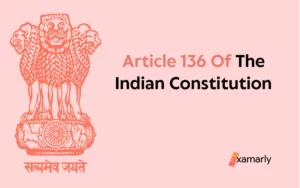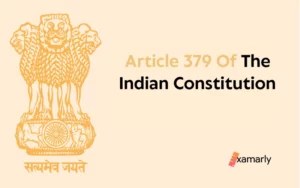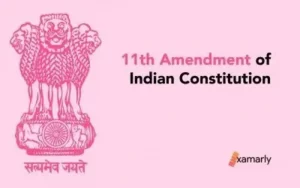An Overview
A Money Bill refers to a bill that deals with the allocation of funds. In other words, the Bills relating to finances, such as those concerning taxes and public spending, are referred to as Money Bills.
Article 198 of the Indian Constitution outlines the special procedure with respect to the Money Bills. This is an important article from the UPSC exam preparation point of view.
If you are curious about the scenarios that can occur in context of the Money Bill being introduced in the Houses of the Legislature of a State, then you are at the right place. This article takes a close look at Article 198 of the Indian Constitution and its clauses. Read along to get knowledge about this article.
- An Overview
- Article 198 Of The Indian Constitution: Provisions Related To Money Bills
- Clause (1) Of Article 198 Of The Indian Constitution: Explained
- Clause (2) Of Article 198 Of The Indian Constitution: Explained
- Clause (3) Of Article 198 Of The Indian Constitution: Explained
- Clause (4) Of Article 198 Of The Indian Constitution: Explained
- Clause (5) Of Article 198 Of The Indian Constitution: Explained
- Summing Up
- FAQs Related To Article 198 Of The Indian Constitution
- How Many Clauses Are There In Article 198 Of The Indian Constitution?
- What Clause Of Article 198 Of The Indian Constitution Upholds The Laying Down Of A Money Bill In The Legislative Council Of A State?
- What Is The Time Duration Of Sending Back A Money Bill To The Legislative Assembly By The Legislative Council?
- What Is A Money Bill?
- What Is The Fate Of A Money Bill In The Parliament?
- Who Has The Authority to Decide Whether A Bill Qualifies To Be A Money Bill Or Not?
Article 198 Of The Indian Constitution: Provisions Related To Money Bills
Article 198 revolves around the special procedure that is put in place in respect of Money Bills. This article has five clauses which provide the provisions that the talk about the details of the process related to the introduction and passing of the concerned Bill in the Houses of the Legislature of A State.
Let us now look at each of the five clauses one by one and analyse its contents. This will help to understand the meaning and purpose of the Article 198 of the Indian Constitution. The clauses have been quoted from the Constitution of India.
Clause (1) Of Article 198 Of The Indian Constitution: Explained
(1) A Money Bill shall not be introduced in a Legislative Council.
The first clause of Article 198 states that the Money Bill is prohibited from being introduced in the Legislative Council of a State, also known as the Vidhan Parishad. Rather, it should be introduced in the Legislative Assembly of a State, that is, the Vidhan Sabha.
Clause (2) Of Article 198 Of The Indian Constitution: Explained
(2) After a Money Bill has been passed by the Legislative Assembly of a State having a Legislative Council, it shall be transmitted to the Legislative Council for its recommendations, and the Legislative Council shall within a period of fourteen days from the date of its receipt of the Bill return the Bill to the Legislative Assembly with its recommendations, and the Legislative Assembly may thereupon either accept or reject all or any of the recommendations of the Legislative Council.
The second clause of the article explains that after a Money Bill has been approved by the Legislative Assembly of a State, or the Vidhan Sabha that also has a Legislative Council, it must be passed over to the Legislative Council of that State, that is the Vidhan Parishad for its specific suggestions.
After that, it is the responsibility of the Legislative Council to return the Bill to the Legislative Assembly along with its recommendations within a period of fourteen days from the date it receives the Bill. The decision rests on the Legislative Assembly to either choose to accept or reject all or any of the suggestions that have been put forth by the Legislative Council.
Clause (3) Of Article 198 Of The Indian Constitution: Explained
(3) If the Legislative Assembly accepts any of the recommendations of the Legislative Council, the Money Bill shall be deemed to have been passed by both Houses with the amendments recommended by the Legislative Council and accepted by the Legislative Assembly.
Clause (3) of this article relates to the situation in which the suggested changes of the Vidhan Parishad have been accepted by the Vidhan Sabha.
If the Legislative Assembly decides to agree to any of the revisions put forth by the Legislative Council, then the Money Bill will be considered to have been accepted and approved by both Houses of the Legislature of a State. This approval is along with the alterations that were suggested by the Legislative Council and accepted by the Legislative Assembly.
Clause (4) Of Article 198 Of The Indian Constitution: Explained
(4) If the Legislative Assembly does not accept any of the recommendations of the Legislative Council, the Money Bill shall be deemed to have been passed by both Houses in the form in which it was passed by the Legislative Assembly without any of the amendments recommended by the Legislative Council.
The penultimate clause of the articles talks about the scenario wherein the Vidhan Sabha does not approve of the modifications that are suggested by the Vidhan Parishad.
If the Legislative Assembly does not agree to bring about any of the suggestions made by the Legislative Council, then the Money Bill shall be considered to have received the approval of both the Houses. The approval of this Bill is in the form which does not include any of the revisions thought necessary by the Legislative Council and it was passed by the Legislative Assembly in its original form. This means that the Money Bill will remain unchanged from the version that was passed by the Legislative Assembly.
Clause (5) Of Article 198 Of The Indian Constitution: Explained
(5) If a Money Bill passed by the Legislative Assembly and transmitted to the Legislative Council for its recommendations is not returned to the Legislative Assembly within the said period of fourteen days, it shall be deemed to have been passed by both Houses at the expiration of the said period in the form in which it was passed by the Legislative Assembly.
The final clause of this article throws light on the fact that any Money Bill needs to be passed by the Legislative Assembly of a State first. After that, it needs to be handed over to the Legislative Council for any suggested changes within a fixed period of time. This time is of fourteen days.
In other words, the clause states that suppose there is a Money Bill that was passed by the Legislative Assembly and forwarded to the Legislative Council for possible modifications. If the concerned Bill is not sent back to the Legislative Assembly within a period of fourteen days, then it is considered to have been passed by approval of both the Houses in the same way that it was passed by the Legislative Assembly.
Summing Up
At this point, it be would be safe to assume that you must have some idea about the various types and passing of Bills. This article takes into account the fate of one such Bill.
Article 198 of the Indian Constitution talks about the special procedure in respect to Money Bills and the process of its approval in the Houses of the Legislature of a State. We learnt from the five clauses of this article the requirements and conditions associated with the introduction and approval of the Money Bill in the Houses of the Legislature of a State.
You Might Also Like:
| Article 197 Of The Indian Constitution | Article 196 Of The Indian Constitution |
| Article 195 Of The Indian Constitution | Article 194 Of The Indian Constitution |
FAQs Related To Article 198 Of The Indian Constitution
How Many Clauses Are There In Article 198 Of The Indian Constitution?
Article 198 of the Indian Constitution contains five clauses, namely- clause (1), clause (2), clause (3), clause (4), and clause (5).
What Clause Of Article 198 Of The Indian Constitution Upholds The Laying Down Of A Money Bill In The Legislative Council Of A State?
Clause (1) of Article 198 of the Indian Constitution clearly mentions that any Money Bill should not be introduced in the State Legislative Council, which is also known as the Vidhan Parishad.
What Is The Time Duration Of Sending Back A Money Bill To The Legislative Assembly By The Legislative Council?
The Legislative Council, or the Vidhan Parishad has to ensure that a Money Bill has to be returned to the Legislative Assembly within a period of fourteen days along with the suggested modifications to be done in the Bill.
What Is A Money Bill?
Any Bill that serves the purpose of taxation, public or government spending, or related to financial matters of the nation can be counted as a Money Bill.
What Is The Fate Of A Money Bill In The Parliament?
Such a Bill can be exclusively introduced only in the Lok Sabha, or the Lower House of the Parliament from which it is then transferred to the Rajya Sabha, also known as the Upper House of the Parliament.
Who Has The Authority to Decide Whether A Bill Qualifies To Be A Money Bill Or Not?
The authority to decide this lies in the hands of the Speaker of Lok Sabha.






